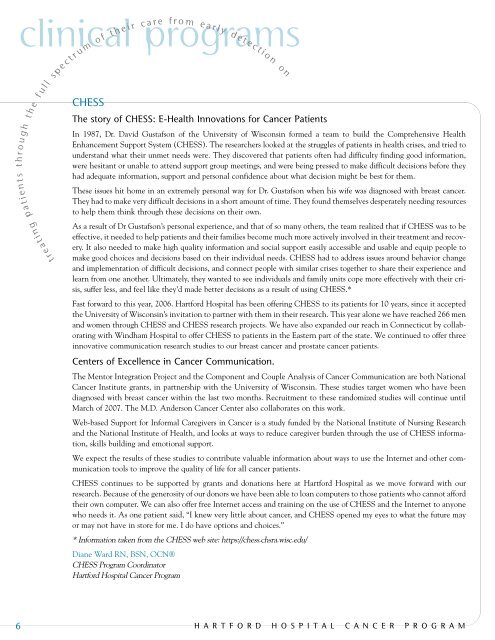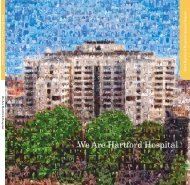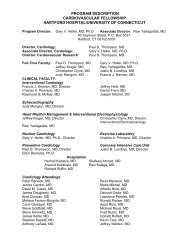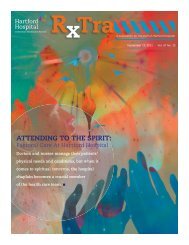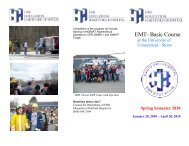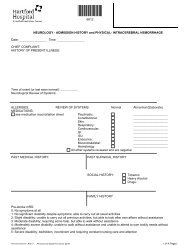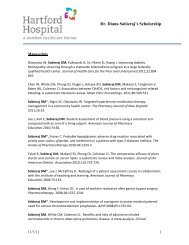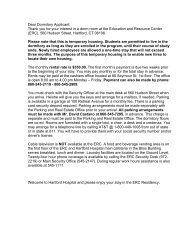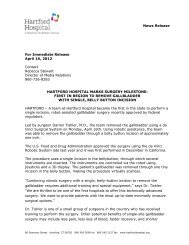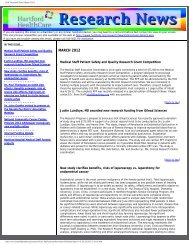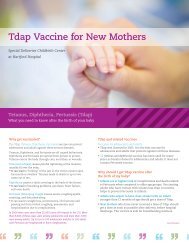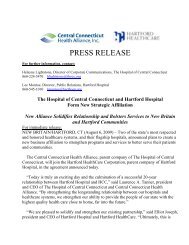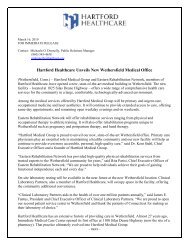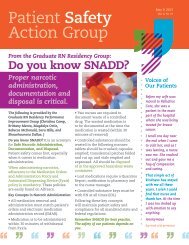Cancer Center Annual Report, 2006 - Hartford Hospital!
Cancer Center Annual Report, 2006 - Hartford Hospital!
Cancer Center Annual Report, 2006 - Hartford Hospital!
Create successful ePaper yourself
Turn your PDF publications into a flip-book with our unique Google optimized e-Paper software.
clinical programs<br />
l s p e c t r u m o<br />
f t h e i<br />
r c a r e<br />
f r o m<br />
e a r<br />
l y<br />
d e t e c t<br />
i o n<br />
o n<br />
t s<br />
f u l<br />
t h r o u g h t h e<br />
t r e a t i n g p a t i e n<br />
CHESS<br />
The story of CHESS: E-Health Innovations for <strong>Cancer</strong> Patients<br />
In 1987, Dr. David Gustafson of the University of Wisconsin formed a team to build the Comprehensive Health<br />
Enhancement Support System (CHESS). The researchers looked at the struggles of patients in health crises, and tried to<br />
understand what their unmet needs were. They discovered that patients often had difficulty finding good information,<br />
were hesitant or unable to attend support group meetings, and were being pressed to make difficult decisions before they<br />
had adequate information, support and personal confidence about what decision might be best for them.<br />
These issues hit home in an extremely personal way for Dr. Gustafson when his wife was diagnosed with breast cancer.<br />
They had to make very difficult decisions in a short amount of time. They found themselves desperately needing resources<br />
to help them think through these decisions on their own.<br />
As a result of Dr Gustafson’s personal experience, and that of so many others, the team realized that if CHESS was to be<br />
effective, it needed to help patients and their families become much more actively involved in their treatment and recovery.<br />
It also needed to make high quality information and social support easily accessible and usable and equip people to<br />
make good choices and decisions based on their individual needs. CHESS had to address issues around behavior change<br />
and implementation of difficult decisions, and connect people with similar crises together to share their experience and<br />
learn from one another. Ultimately, they wanted to see individuals and family units cope more effectively with their crisis,<br />
suffer less, and feel like they’d made better decisions as a result of using CHESS.*<br />
Fast forward to this year, <strong>2006</strong>. <strong>Hartford</strong> <strong>Hospital</strong> has been offering CHESS to its patients for 10 years, since it accepted<br />
the University of Wisconsin’s invitation to partner with them in their research. This year alone we have reached 266 men<br />
and women through CHESS and CHESS research projects. We have also expanded our reach in Connecticut by collaborating<br />
with Windham <strong>Hospital</strong> to offer CHESS to patients in the Eastern part of the state. We continued to offer three<br />
innovative communication research studies to our breast cancer and prostate cancer patients.<br />
<strong>Center</strong>s of Excellence in <strong>Cancer</strong> Communication.<br />
The Mentor Integration Project and the Component and Couple Analysis of <strong>Cancer</strong> Communication are both National<br />
<strong>Cancer</strong> Institute grants, in partnership with the University of Wisconsin. These studies target women who have been<br />
diagnosed with breast cancer within the last two months. Recruitment to these randomized studies will continue until<br />
March of 2007. The M.D. Anderson <strong>Cancer</strong> <strong>Center</strong> also collaborates on this work.<br />
Web-based Support for Informal Caregivers in <strong>Cancer</strong> is a study funded by the National Institute of Nursing Research<br />
and the National Institute of Health, and looks at ways to reduce caregiver burden through the use of CHESS information,<br />
skills building and emotional support.<br />
We expect the results of these studies to contribute valuable information about ways to use the Internet and other communication<br />
tools to improve the quality of life for all cancer patients.<br />
CHESS continues to be supported by grants and donations here at <strong>Hartford</strong> <strong>Hospital</strong> as we move forward with our<br />
research. Because of the generosity of our donors we have been able to loan computers to those patients who cannot afford<br />
their own computer. We can also offer free Internet access and training on the use of CHESS and the Internet to anyone<br />
who needs it. As one patient said, “I knew very little about cancer, and CHESS opened my eyes to what the future may<br />
or may not have in store for me. I do have options and choices.”<br />
* Information taken from the CHESS web site: https://chess.chsra.wisc.edu/<br />
Diane Ward RN, BSN, OCN®<br />
CHESS Program Coordinator<br />
<strong>Hartford</strong> <strong>Hospital</strong> <strong>Cancer</strong> Program<br />
6 HARTFORD HOSPITAL CANCER PROGRAM


